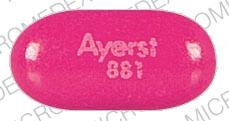Conjugated estrogens/meprobamate Interactions
There are 658 drugs known to interact with conjugated estrogens/meprobamate, along with 27 disease interactions, and 4 alcohol/food interactions. Of the total drug interactions, 62 are major, 585 are moderate, and 11 are minor.
- View all 658 medications that may interact with conjugated estrogens/meprobamate
- View conjugated estrogens/meprobamate alcohol/food interactions (4)
- View conjugated estrogens/meprobamate disease interactions (27)
Most frequently checked interactions
View interaction reports for conjugated estrogens / meprobamate and the medicines listed below.
- Acidophilus Extra Strength (lactobacillus acidophilus)
- Adriamycin (doxorubicin)
- Advate (antihemophilic factor)
- Betac (ascorbic acid)
- Blenoxane (bleomycin)
- Calcium Liquid Softgel (calcium carbonate)
- CeeNU (lomustine)
- Cetrotide (cetrorelix)
- Cleocin (clindamycin)
- Cleocin Ovules (clindamycin topical)
- Coreg CR (carvedilol)
- Cystex (benzoic acid / methenamine / sodium salicylate)
- Cytovene (ganciclovir)
- Cytoxan (cyclophosphamide)
- Depakene (valproic acid)
- Diacomit (stiripentol)
- Diamox (acetazolamide)
- Enablex (darifenacin)
- Epogen (epoetin alfa)
- Evening Primrose Oil (evening primrose)
- Exjade (deferasirox)
- Extraneal (lvp solution)
- Feiba (anti-inhibitor coagulant complex)
- Gonal-f (follicle stimulating hormone)
- Hemlibra (emicizumab)
- Hizentra (immune globulin subcutaneous)
- Ingrezza (valbenazine)
- Kalydeco (ivacaftor)
- Lortab (acetaminophen / hydrocodone)
- Lotrel (amlodipine / benazepril)
Conjugated estrogens/meprobamate alcohol/food interactions
There are 4 alcohol/food interactions with conjugated estrogens / meprobamate.
Conjugated estrogens/meprobamate disease interactions
There are 27 disease interactions with conjugated estrogens / meprobamate which include:
- alcohol intox
- depression
- drug dependence
- abnormal vaginal bleeding
- carcinomas (estrogenic)
- hypercalcemia in breast cancer
- hypertension
- thromboembolism/cardiovascular
- hepatic neoplasms
- porphyria
- glaucoma
- liver disease
- renal/liver disease
- resp depression
- angioedema
- gallbladder disease
- hypercalcemia
- hyperlipidemia
- liver disease
- melasma
- depression
- fluid retention
- glucose intolerance
- retinal thrombosis
- thyroid function tests
- drug dependence
- seizure disorders
Drug Interaction Classification
| Highly clinically significant. Avoid combinations; the risk of the interaction outweighs the benefit. | |
| Moderately clinically significant. Usually avoid combinations; use it only under special circumstances. | |
| Minimally clinically significant. Minimize risk; assess risk and consider an alternative drug, take steps to circumvent the interaction risk and/or institute a monitoring plan. | |
| No interaction information available. |
See also:
Further information
Always consult your healthcare provider to ensure the information displayed on this page applies to your personal circumstances.


